Corporation and Business Law Assignment: Agency, Veil, and ASIC
VerifiedAdded on 2021/06/16
|10
|2281
|458
Homework Assignment
AI Summary
This assignment solution addresses key concepts in corporation and business law, focusing on the law of agency and corporate veil. The first part analyzes the application of agency law, specifically the doctrine of election in situations involving undisclosed principals and apparent authority. It examines the rights and obligations of principals, agents, and third parties in contractual relationships. The second part delves into the concept of piercing the corporate veil, citing cases like Salomon v A Salomon and Co Ltd and Adams v Cape Industries plc, to determine the liability of shareholders. The assignment considers scenarios where the corporate veil might be pierced, and when ASIC (Australian Securities and Investments Commission) might reject a company application based on prior criminal convictions. The solution provides a comprehensive analysis of legal principles and their practical application in various business scenarios.
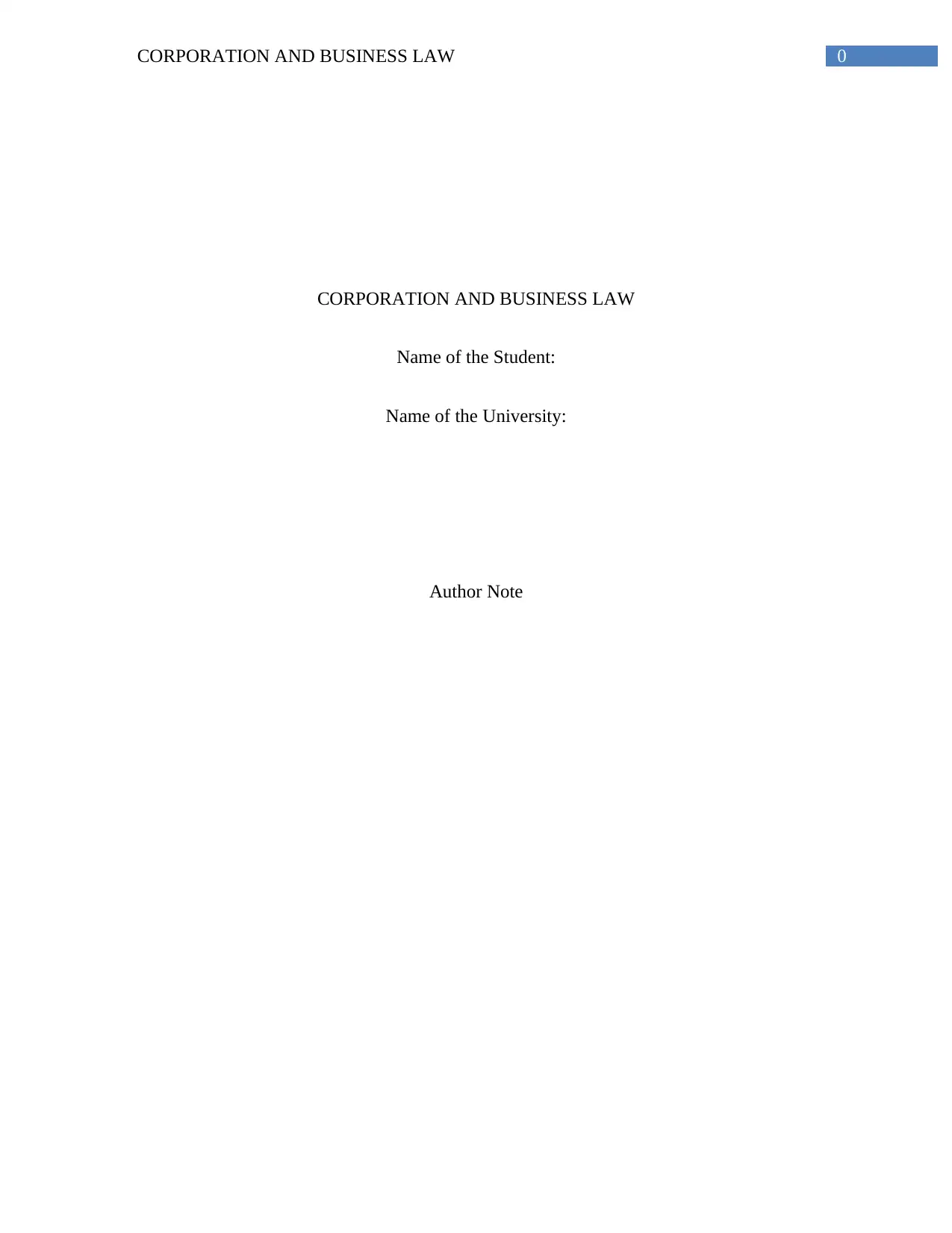
0CORPORATION AND BUSINESS LAW
CORPORATION AND BUSINESS LAW
Name of the Student:
Name of the University:
Author Note
CORPORATION AND BUSINESS LAW
Name of the Student:
Name of the University:
Author Note
Paraphrase This Document
Need a fresh take? Get an instant paraphrase of this document with our AI Paraphraser
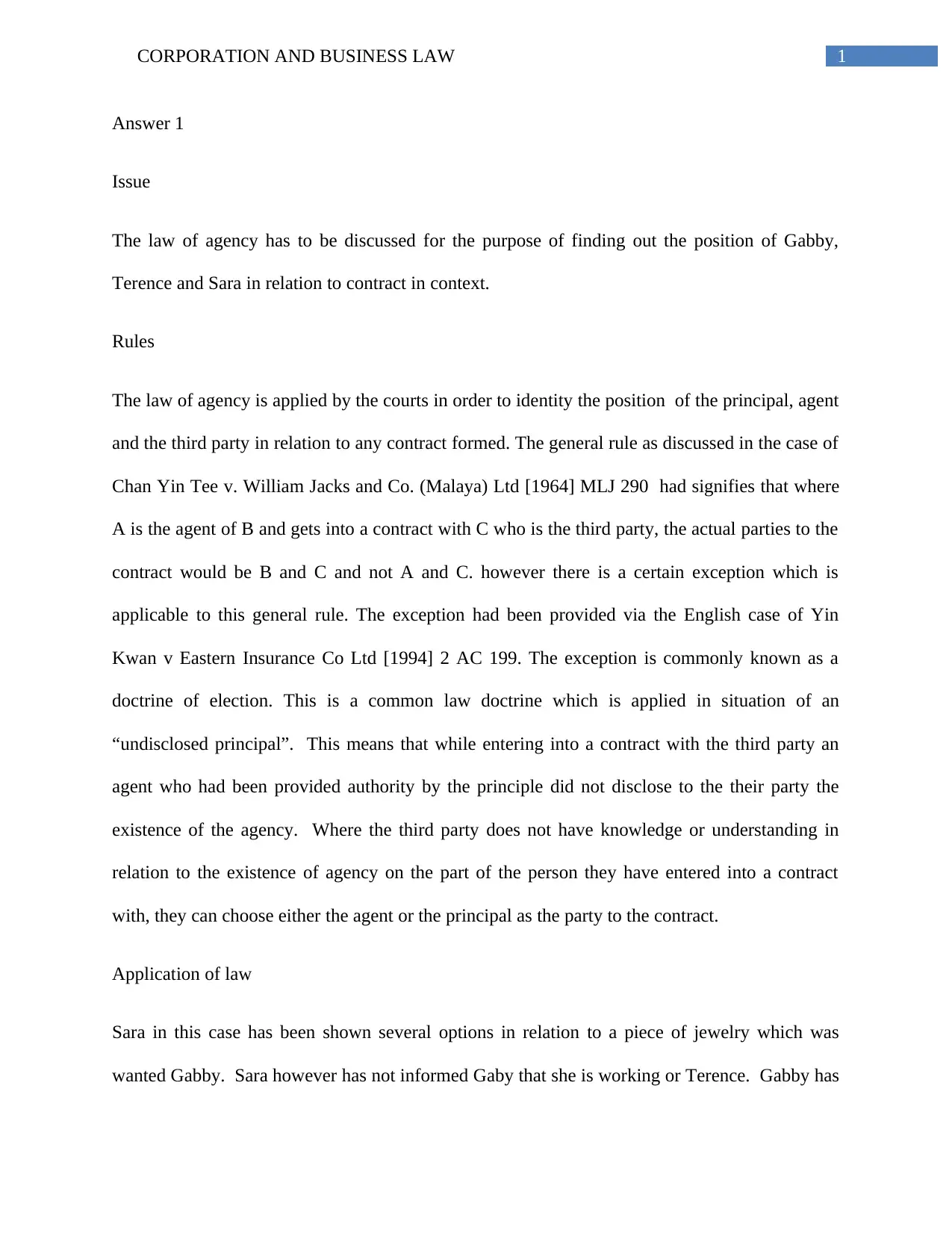
1CORPORATION AND BUSINESS LAW
Answer 1
Issue
The law of agency has to be discussed for the purpose of finding out the position of Gabby,
Terence and Sara in relation to contract in context.
Rules
The law of agency is applied by the courts in order to identity the position of the principal, agent
and the third party in relation to any contract formed. The general rule as discussed in the case of
Chan Yin Tee v. William Jacks and Co. (Malaya) Ltd [1964] MLJ 290 had signifies that where
A is the agent of B and gets into a contract with C who is the third party, the actual parties to the
contract would be B and C and not A and C. however there is a certain exception which is
applicable to this general rule. The exception had been provided via the English case of Yin
Kwan v Eastern Insurance Co Ltd [1994] 2 AC 199. The exception is commonly known as a
doctrine of election. This is a common law doctrine which is applied in situation of an
“undisclosed principal”. This means that while entering into a contract with the third party an
agent who had been provided authority by the principle did not disclose to the their party the
existence of the agency. Where the third party does not have knowledge or understanding in
relation to the existence of agency on the part of the person they have entered into a contract
with, they can choose either the agent or the principal as the party to the contract.
Application of law
Sara in this case has been shown several options in relation to a piece of jewelry which was
wanted Gabby. Sara however has not informed Gaby that she is working or Terence. Gabby has
Answer 1
Issue
The law of agency has to be discussed for the purpose of finding out the position of Gabby,
Terence and Sara in relation to contract in context.
Rules
The law of agency is applied by the courts in order to identity the position of the principal, agent
and the third party in relation to any contract formed. The general rule as discussed in the case of
Chan Yin Tee v. William Jacks and Co. (Malaya) Ltd [1964] MLJ 290 had signifies that where
A is the agent of B and gets into a contract with C who is the third party, the actual parties to the
contract would be B and C and not A and C. however there is a certain exception which is
applicable to this general rule. The exception had been provided via the English case of Yin
Kwan v Eastern Insurance Co Ltd [1994] 2 AC 199. The exception is commonly known as a
doctrine of election. This is a common law doctrine which is applied in situation of an
“undisclosed principal”. This means that while entering into a contract with the third party an
agent who had been provided authority by the principle did not disclose to the their party the
existence of the agency. Where the third party does not have knowledge or understanding in
relation to the existence of agency on the part of the person they have entered into a contract
with, they can choose either the agent or the principal as the party to the contract.
Application of law
Sara in this case has been shown several options in relation to a piece of jewelry which was
wanted Gabby. Sara however has not informed Gaby that she is working or Terence. Gabby has
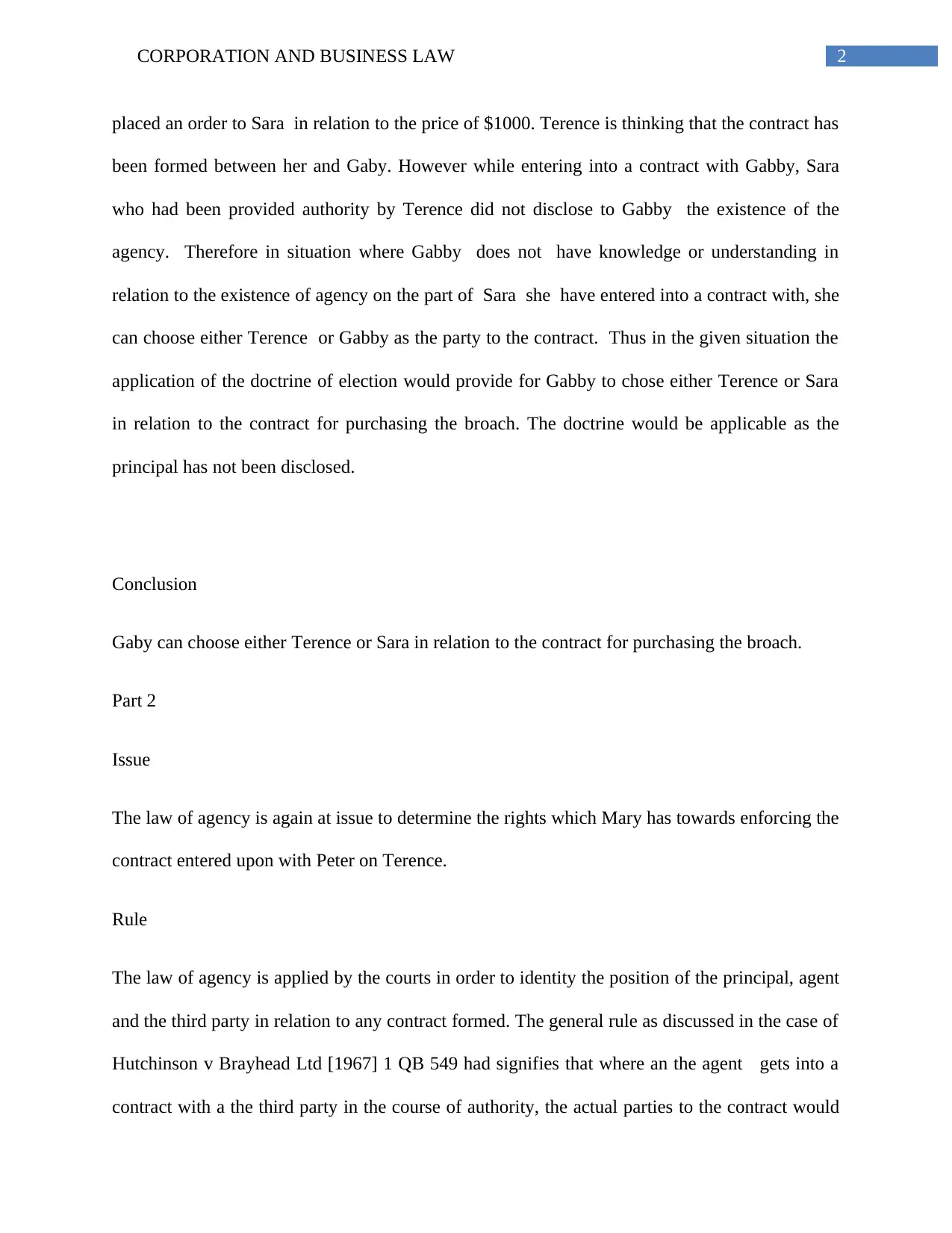
2CORPORATION AND BUSINESS LAW
placed an order to Sara in relation to the price of $1000. Terence is thinking that the contract has
been formed between her and Gaby. However while entering into a contract with Gabby, Sara
who had been provided authority by Terence did not disclose to Gabby the existence of the
agency. Therefore in situation where Gabby does not have knowledge or understanding in
relation to the existence of agency on the part of Sara she have entered into a contract with, she
can choose either Terence or Gabby as the party to the contract. Thus in the given situation the
application of the doctrine of election would provide for Gabby to chose either Terence or Sara
in relation to the contract for purchasing the broach. The doctrine would be applicable as the
principal has not been disclosed.
Conclusion
Gaby can choose either Terence or Sara in relation to the contract for purchasing the broach.
Part 2
Issue
The law of agency is again at issue to determine the rights which Mary has towards enforcing the
contract entered upon with Peter on Terence.
Rule
The law of agency is applied by the courts in order to identity the position of the principal, agent
and the third party in relation to any contract formed. The general rule as discussed in the case of
Hutchinson v Brayhead Ltd [1967] 1 QB 549 had signifies that where an the agent gets into a
contract with a the third party in the course of authority, the actual parties to the contract would
placed an order to Sara in relation to the price of $1000. Terence is thinking that the contract has
been formed between her and Gaby. However while entering into a contract with Gabby, Sara
who had been provided authority by Terence did not disclose to Gabby the existence of the
agency. Therefore in situation where Gabby does not have knowledge or understanding in
relation to the existence of agency on the part of Sara she have entered into a contract with, she
can choose either Terence or Gabby as the party to the contract. Thus in the given situation the
application of the doctrine of election would provide for Gabby to chose either Terence or Sara
in relation to the contract for purchasing the broach. The doctrine would be applicable as the
principal has not been disclosed.
Conclusion
Gaby can choose either Terence or Sara in relation to the contract for purchasing the broach.
Part 2
Issue
The law of agency is again at issue to determine the rights which Mary has towards enforcing the
contract entered upon with Peter on Terence.
Rule
The law of agency is applied by the courts in order to identity the position of the principal, agent
and the third party in relation to any contract formed. The general rule as discussed in the case of
Hutchinson v Brayhead Ltd [1967] 1 QB 549 had signifies that where an the agent gets into a
contract with a the third party in the course of authority, the actual parties to the contract would
⊘ This is a preview!⊘
Do you want full access?
Subscribe today to unlock all pages.

Trusted by 1+ million students worldwide
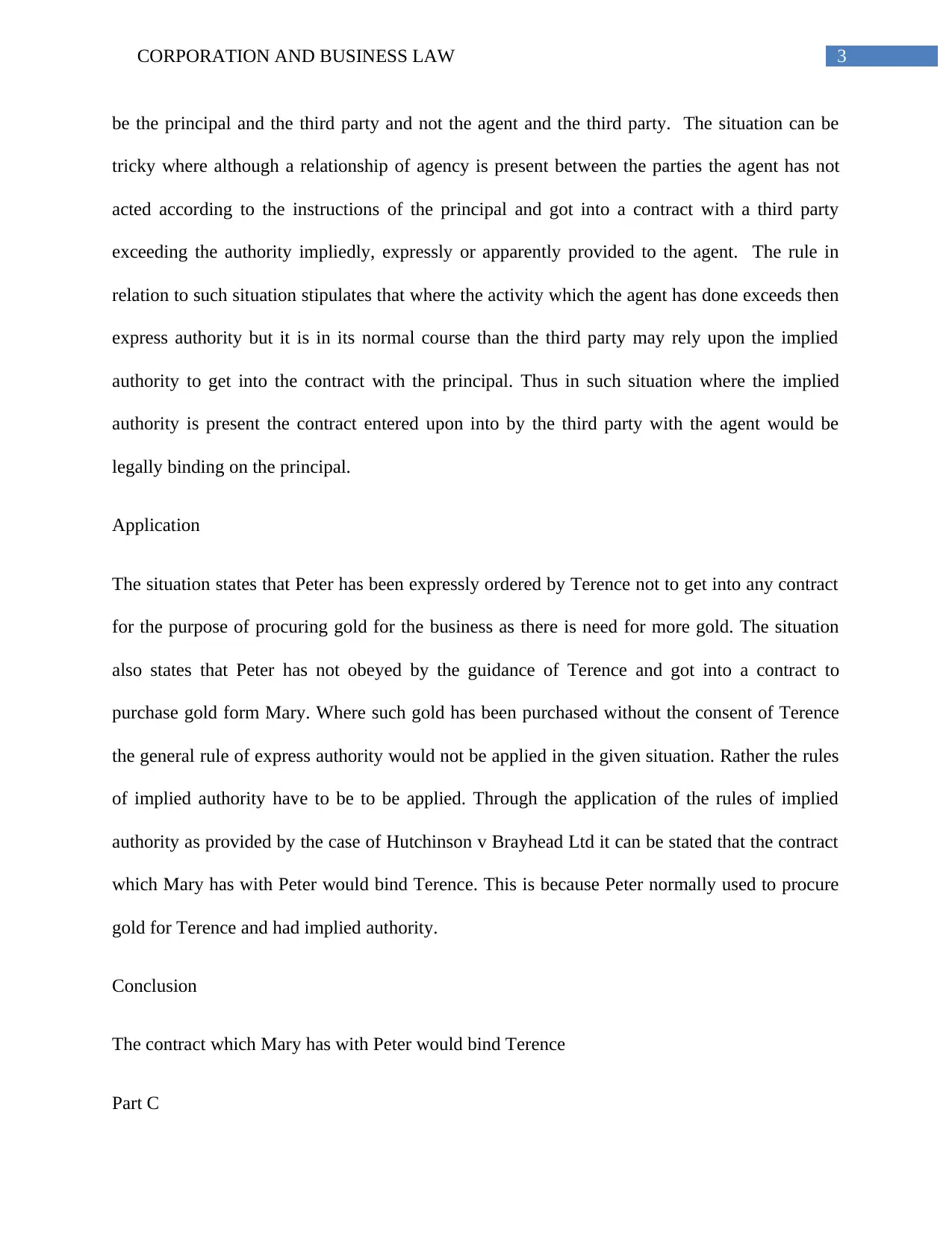
3CORPORATION AND BUSINESS LAW
be the principal and the third party and not the agent and the third party. The situation can be
tricky where although a relationship of agency is present between the parties the agent has not
acted according to the instructions of the principal and got into a contract with a third party
exceeding the authority impliedly, expressly or apparently provided to the agent. The rule in
relation to such situation stipulates that where the activity which the agent has done exceeds then
express authority but it is in its normal course than the third party may rely upon the implied
authority to get into the contract with the principal. Thus in such situation where the implied
authority is present the contract entered upon into by the third party with the agent would be
legally binding on the principal.
Application
The situation states that Peter has been expressly ordered by Terence not to get into any contract
for the purpose of procuring gold for the business as there is need for more gold. The situation
also states that Peter has not obeyed by the guidance of Terence and got into a contract to
purchase gold form Mary. Where such gold has been purchased without the consent of Terence
the general rule of express authority would not be applied in the given situation. Rather the rules
of implied authority have to be to be applied. Through the application of the rules of implied
authority as provided by the case of Hutchinson v Brayhead Ltd it can be stated that the contract
which Mary has with Peter would bind Terence. This is because Peter normally used to procure
gold for Terence and had implied authority.
Conclusion
The contract which Mary has with Peter would bind Terence
Part C
be the principal and the third party and not the agent and the third party. The situation can be
tricky where although a relationship of agency is present between the parties the agent has not
acted according to the instructions of the principal and got into a contract with a third party
exceeding the authority impliedly, expressly or apparently provided to the agent. The rule in
relation to such situation stipulates that where the activity which the agent has done exceeds then
express authority but it is in its normal course than the third party may rely upon the implied
authority to get into the contract with the principal. Thus in such situation where the implied
authority is present the contract entered upon into by the third party with the agent would be
legally binding on the principal.
Application
The situation states that Peter has been expressly ordered by Terence not to get into any contract
for the purpose of procuring gold for the business as there is need for more gold. The situation
also states that Peter has not obeyed by the guidance of Terence and got into a contract to
purchase gold form Mary. Where such gold has been purchased without the consent of Terence
the general rule of express authority would not be applied in the given situation. Rather the rules
of implied authority have to be to be applied. Through the application of the rules of implied
authority as provided by the case of Hutchinson v Brayhead Ltd it can be stated that the contract
which Mary has with Peter would bind Terence. This is because Peter normally used to procure
gold for Terence and had implied authority.
Conclusion
The contract which Mary has with Peter would bind Terence
Part C
Paraphrase This Document
Need a fresh take? Get an instant paraphrase of this document with our AI Paraphraser
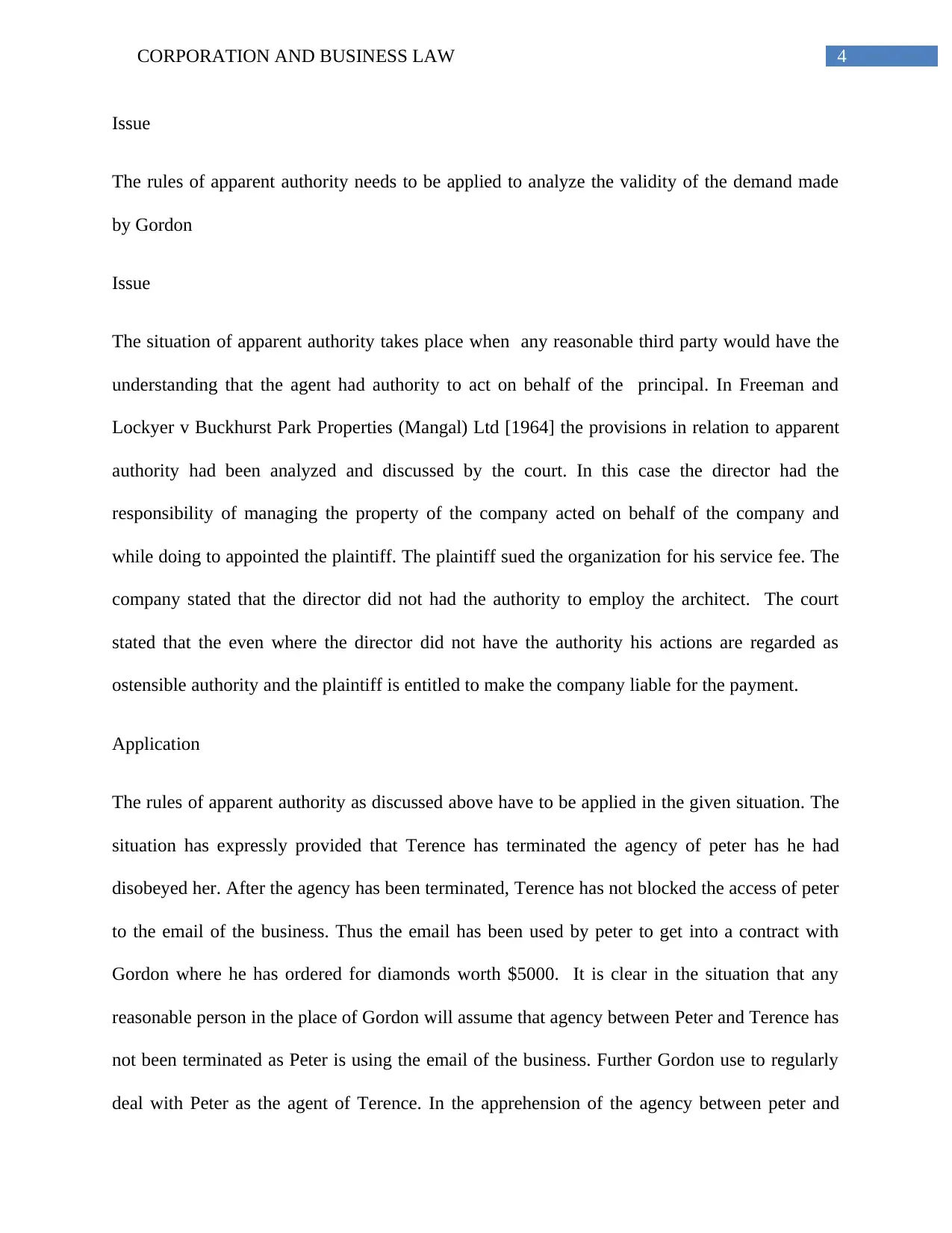
4CORPORATION AND BUSINESS LAW
Issue
The rules of apparent authority needs to be applied to analyze the validity of the demand made
by Gordon
Issue
The situation of apparent authority takes place when any reasonable third party would have the
understanding that the agent had authority to act on behalf of the principal. In Freeman and
Lockyer v Buckhurst Park Properties (Mangal) Ltd [1964] the provisions in relation to apparent
authority had been analyzed and discussed by the court. In this case the director had the
responsibility of managing the property of the company acted on behalf of the company and
while doing to appointed the plaintiff. The plaintiff sued the organization for his service fee. The
company stated that the director did not had the authority to employ the architect. The court
stated that the even where the director did not have the authority his actions are regarded as
ostensible authority and the plaintiff is entitled to make the company liable for the payment.
Application
The rules of apparent authority as discussed above have to be applied in the given situation. The
situation has expressly provided that Terence has terminated the agency of peter has he had
disobeyed her. After the agency has been terminated, Terence has not blocked the access of peter
to the email of the business. Thus the email has been used by peter to get into a contract with
Gordon where he has ordered for diamonds worth $5000. It is clear in the situation that any
reasonable person in the place of Gordon will assume that agency between Peter and Terence has
not been terminated as Peter is using the email of the business. Further Gordon use to regularly
deal with Peter as the agent of Terence. In the apprehension of the agency between peter and
Issue
The rules of apparent authority needs to be applied to analyze the validity of the demand made
by Gordon
Issue
The situation of apparent authority takes place when any reasonable third party would have the
understanding that the agent had authority to act on behalf of the principal. In Freeman and
Lockyer v Buckhurst Park Properties (Mangal) Ltd [1964] the provisions in relation to apparent
authority had been analyzed and discussed by the court. In this case the director had the
responsibility of managing the property of the company acted on behalf of the company and
while doing to appointed the plaintiff. The plaintiff sued the organization for his service fee. The
company stated that the director did not had the authority to employ the architect. The court
stated that the even where the director did not have the authority his actions are regarded as
ostensible authority and the plaintiff is entitled to make the company liable for the payment.
Application
The rules of apparent authority as discussed above have to be applied in the given situation. The
situation has expressly provided that Terence has terminated the agency of peter has he had
disobeyed her. After the agency has been terminated, Terence has not blocked the access of peter
to the email of the business. Thus the email has been used by peter to get into a contract with
Gordon where he has ordered for diamonds worth $5000. It is clear in the situation that any
reasonable person in the place of Gordon will assume that agency between Peter and Terence has
not been terminated as Peter is using the email of the business. Further Gordon use to regularly
deal with Peter as the agent of Terence. In the apprehension of the agency between peter and
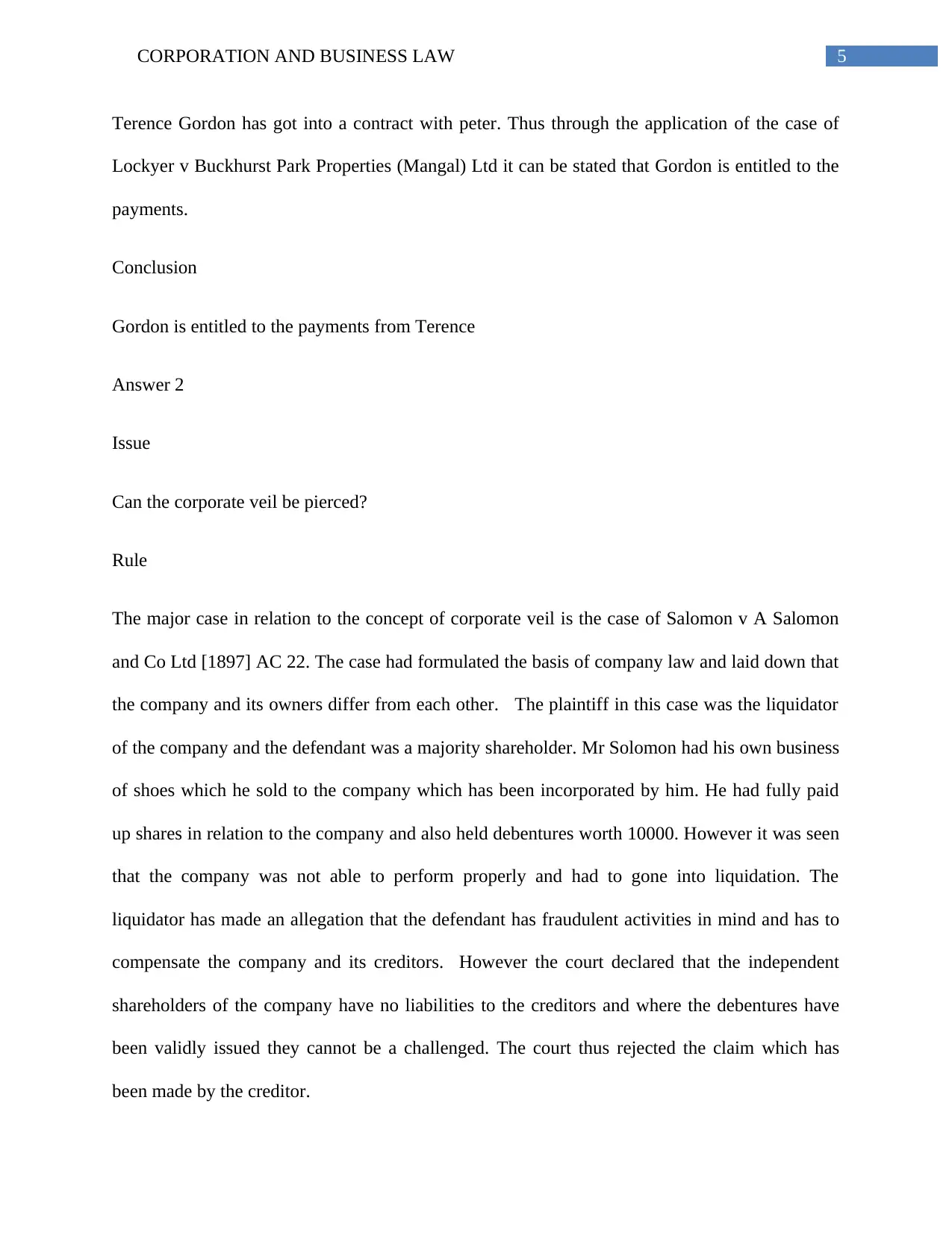
5CORPORATION AND BUSINESS LAW
Terence Gordon has got into a contract with peter. Thus through the application of the case of
Lockyer v Buckhurst Park Properties (Mangal) Ltd it can be stated that Gordon is entitled to the
payments.
Conclusion
Gordon is entitled to the payments from Terence
Answer 2
Issue
Can the corporate veil be pierced?
Rule
The major case in relation to the concept of corporate veil is the case of Salomon v A Salomon
and Co Ltd [1897] AC 22. The case had formulated the basis of company law and laid down that
the company and its owners differ from each other. The plaintiff in this case was the liquidator
of the company and the defendant was a majority shareholder. Mr Solomon had his own business
of shoes which he sold to the company which has been incorporated by him. He had fully paid
up shares in relation to the company and also held debentures worth 10000. However it was seen
that the company was not able to perform properly and had to gone into liquidation. The
liquidator has made an allegation that the defendant has fraudulent activities in mind and has to
compensate the company and its creditors. However the court declared that the independent
shareholders of the company have no liabilities to the creditors and where the debentures have
been validly issued they cannot be a challenged. The court thus rejected the claim which has
been made by the creditor.
Terence Gordon has got into a contract with peter. Thus through the application of the case of
Lockyer v Buckhurst Park Properties (Mangal) Ltd it can be stated that Gordon is entitled to the
payments.
Conclusion
Gordon is entitled to the payments from Terence
Answer 2
Issue
Can the corporate veil be pierced?
Rule
The major case in relation to the concept of corporate veil is the case of Salomon v A Salomon
and Co Ltd [1897] AC 22. The case had formulated the basis of company law and laid down that
the company and its owners differ from each other. The plaintiff in this case was the liquidator
of the company and the defendant was a majority shareholder. Mr Solomon had his own business
of shoes which he sold to the company which has been incorporated by him. He had fully paid
up shares in relation to the company and also held debentures worth 10000. However it was seen
that the company was not able to perform properly and had to gone into liquidation. The
liquidator has made an allegation that the defendant has fraudulent activities in mind and has to
compensate the company and its creditors. However the court declared that the independent
shareholders of the company have no liabilities to the creditors and where the debentures have
been validly issued they cannot be a challenged. The court thus rejected the claim which has
been made by the creditor.
⊘ This is a preview!⊘
Do you want full access?
Subscribe today to unlock all pages.

Trusted by 1+ million students worldwide
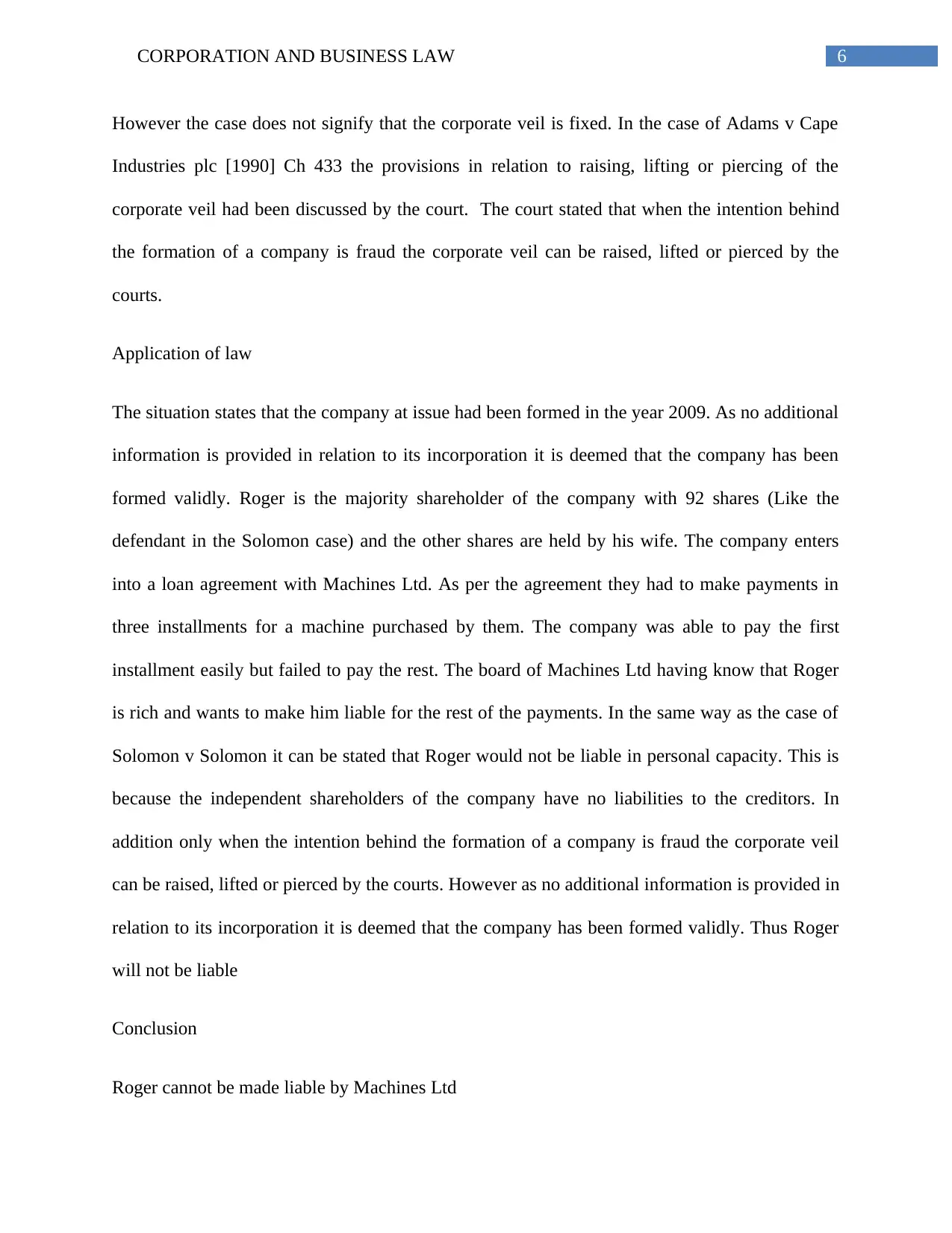
6CORPORATION AND BUSINESS LAW
However the case does not signify that the corporate veil is fixed. In the case of Adams v Cape
Industries plc [1990] Ch 433 the provisions in relation to raising, lifting or piercing of the
corporate veil had been discussed by the court. The court stated that when the intention behind
the formation of a company is fraud the corporate veil can be raised, lifted or pierced by the
courts.
Application of law
The situation states that the company at issue had been formed in the year 2009. As no additional
information is provided in relation to its incorporation it is deemed that the company has been
formed validly. Roger is the majority shareholder of the company with 92 shares (Like the
defendant in the Solomon case) and the other shares are held by his wife. The company enters
into a loan agreement with Machines Ltd. As per the agreement they had to make payments in
three installments for a machine purchased by them. The company was able to pay the first
installment easily but failed to pay the rest. The board of Machines Ltd having know that Roger
is rich and wants to make him liable for the rest of the payments. In the same way as the case of
Solomon v Solomon it can be stated that Roger would not be liable in personal capacity. This is
because the independent shareholders of the company have no liabilities to the creditors. In
addition only when the intention behind the formation of a company is fraud the corporate veil
can be raised, lifted or pierced by the courts. However as no additional information is provided in
relation to its incorporation it is deemed that the company has been formed validly. Thus Roger
will not be liable
Conclusion
Roger cannot be made liable by Machines Ltd
However the case does not signify that the corporate veil is fixed. In the case of Adams v Cape
Industries plc [1990] Ch 433 the provisions in relation to raising, lifting or piercing of the
corporate veil had been discussed by the court. The court stated that when the intention behind
the formation of a company is fraud the corporate veil can be raised, lifted or pierced by the
courts.
Application of law
The situation states that the company at issue had been formed in the year 2009. As no additional
information is provided in relation to its incorporation it is deemed that the company has been
formed validly. Roger is the majority shareholder of the company with 92 shares (Like the
defendant in the Solomon case) and the other shares are held by his wife. The company enters
into a loan agreement with Machines Ltd. As per the agreement they had to make payments in
three installments for a machine purchased by them. The company was able to pay the first
installment easily but failed to pay the rest. The board of Machines Ltd having know that Roger
is rich and wants to make him liable for the rest of the payments. In the same way as the case of
Solomon v Solomon it can be stated that Roger would not be liable in personal capacity. This is
because the independent shareholders of the company have no liabilities to the creditors. In
addition only when the intention behind the formation of a company is fraud the corporate veil
can be raised, lifted or pierced by the courts. However as no additional information is provided in
relation to its incorporation it is deemed that the company has been formed validly. Thus Roger
will not be liable
Conclusion
Roger cannot be made liable by Machines Ltd
Paraphrase This Document
Need a fresh take? Get an instant paraphrase of this document with our AI Paraphraser
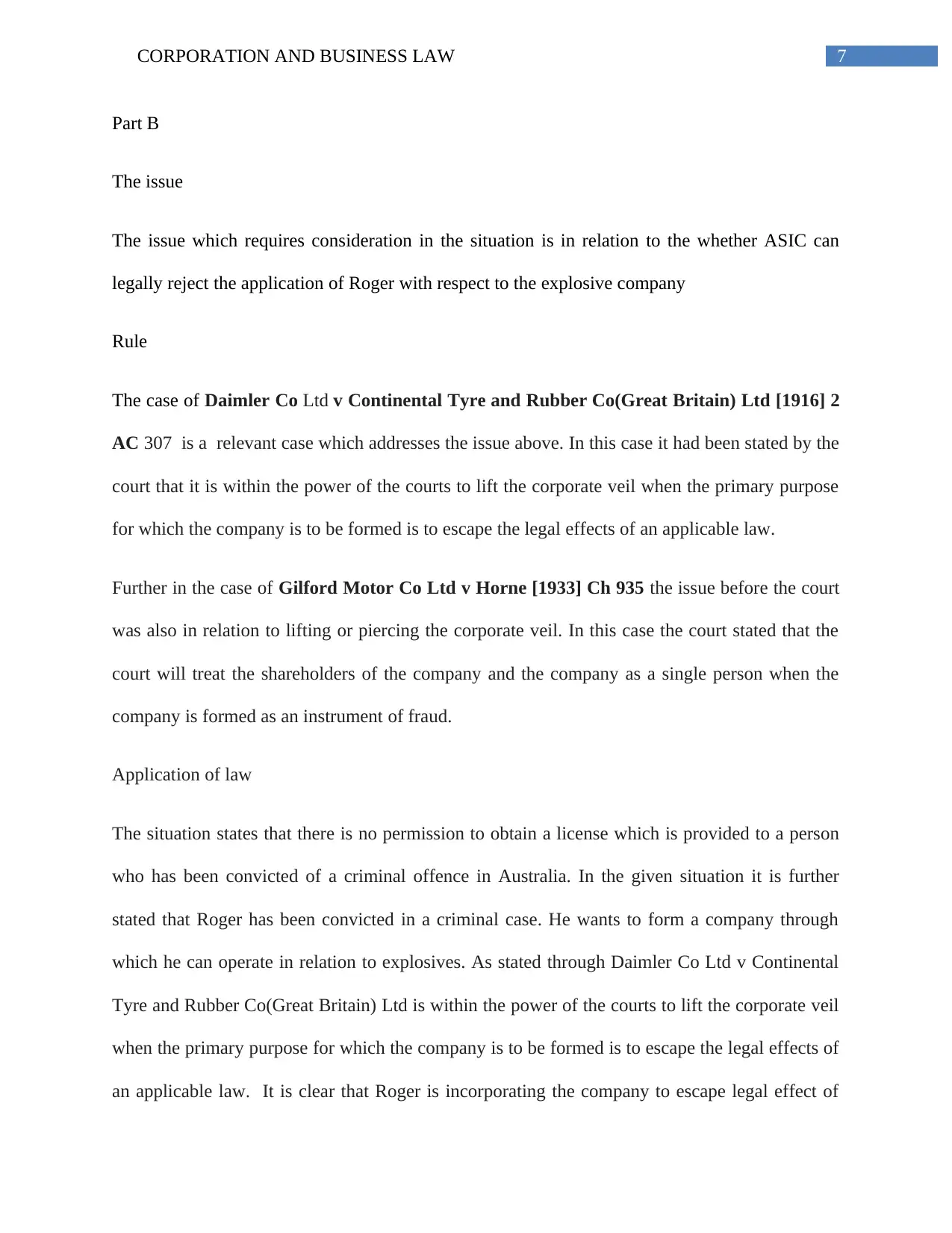
7CORPORATION AND BUSINESS LAW
Part B
The issue
The issue which requires consideration in the situation is in relation to the whether ASIC can
legally reject the application of Roger with respect to the explosive company
Rule
The case of Daimler Co Ltd v Continental Tyre and Rubber Co(Great Britain) Ltd [1916] 2
AC 307 is a relevant case which addresses the issue above. In this case it had been stated by the
court that it is within the power of the courts to lift the corporate veil when the primary purpose
for which the company is to be formed is to escape the legal effects of an applicable law.
Further in the case of Gilford Motor Co Ltd v Horne [1933] Ch 935 the issue before the court
was also in relation to lifting or piercing the corporate veil. In this case the court stated that the
court will treat the shareholders of the company and the company as a single person when the
company is formed as an instrument of fraud.
Application of law
The situation states that there is no permission to obtain a license which is provided to a person
who has been convicted of a criminal offence in Australia. In the given situation it is further
stated that Roger has been convicted in a criminal case. He wants to form a company through
which he can operate in relation to explosives. As stated through Daimler Co Ltd v Continental
Tyre and Rubber Co(Great Britain) Ltd is within the power of the courts to lift the corporate veil
when the primary purpose for which the company is to be formed is to escape the legal effects of
an applicable law. It is clear that Roger is incorporating the company to escape legal effect of
Part B
The issue
The issue which requires consideration in the situation is in relation to the whether ASIC can
legally reject the application of Roger with respect to the explosive company
Rule
The case of Daimler Co Ltd v Continental Tyre and Rubber Co(Great Britain) Ltd [1916] 2
AC 307 is a relevant case which addresses the issue above. In this case it had been stated by the
court that it is within the power of the courts to lift the corporate veil when the primary purpose
for which the company is to be formed is to escape the legal effects of an applicable law.
Further in the case of Gilford Motor Co Ltd v Horne [1933] Ch 935 the issue before the court
was also in relation to lifting or piercing the corporate veil. In this case the court stated that the
court will treat the shareholders of the company and the company as a single person when the
company is formed as an instrument of fraud.
Application of law
The situation states that there is no permission to obtain a license which is provided to a person
who has been convicted of a criminal offence in Australia. In the given situation it is further
stated that Roger has been convicted in a criminal case. He wants to form a company through
which he can operate in relation to explosives. As stated through Daimler Co Ltd v Continental
Tyre and Rubber Co(Great Britain) Ltd is within the power of the courts to lift the corporate veil
when the primary purpose for which the company is to be formed is to escape the legal effects of
an applicable law. It is clear that Roger is incorporating the company to escape legal effect of
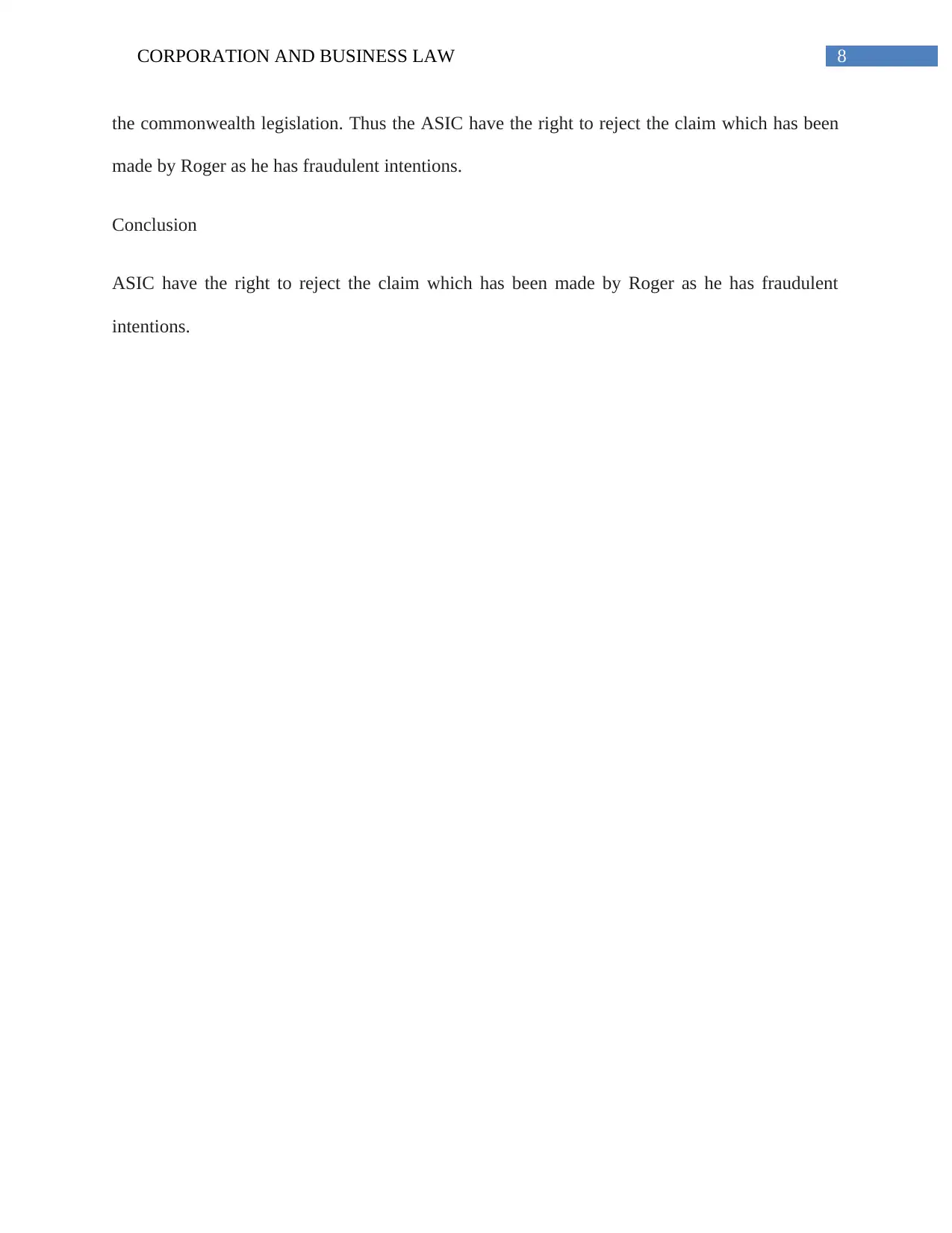
8CORPORATION AND BUSINESS LAW
the commonwealth legislation. Thus the ASIC have the right to reject the claim which has been
made by Roger as he has fraudulent intentions.
Conclusion
ASIC have the right to reject the claim which has been made by Roger as he has fraudulent
intentions.
the commonwealth legislation. Thus the ASIC have the right to reject the claim which has been
made by Roger as he has fraudulent intentions.
Conclusion
ASIC have the right to reject the claim which has been made by Roger as he has fraudulent
intentions.
⊘ This is a preview!⊘
Do you want full access?
Subscribe today to unlock all pages.

Trusted by 1+ million students worldwide
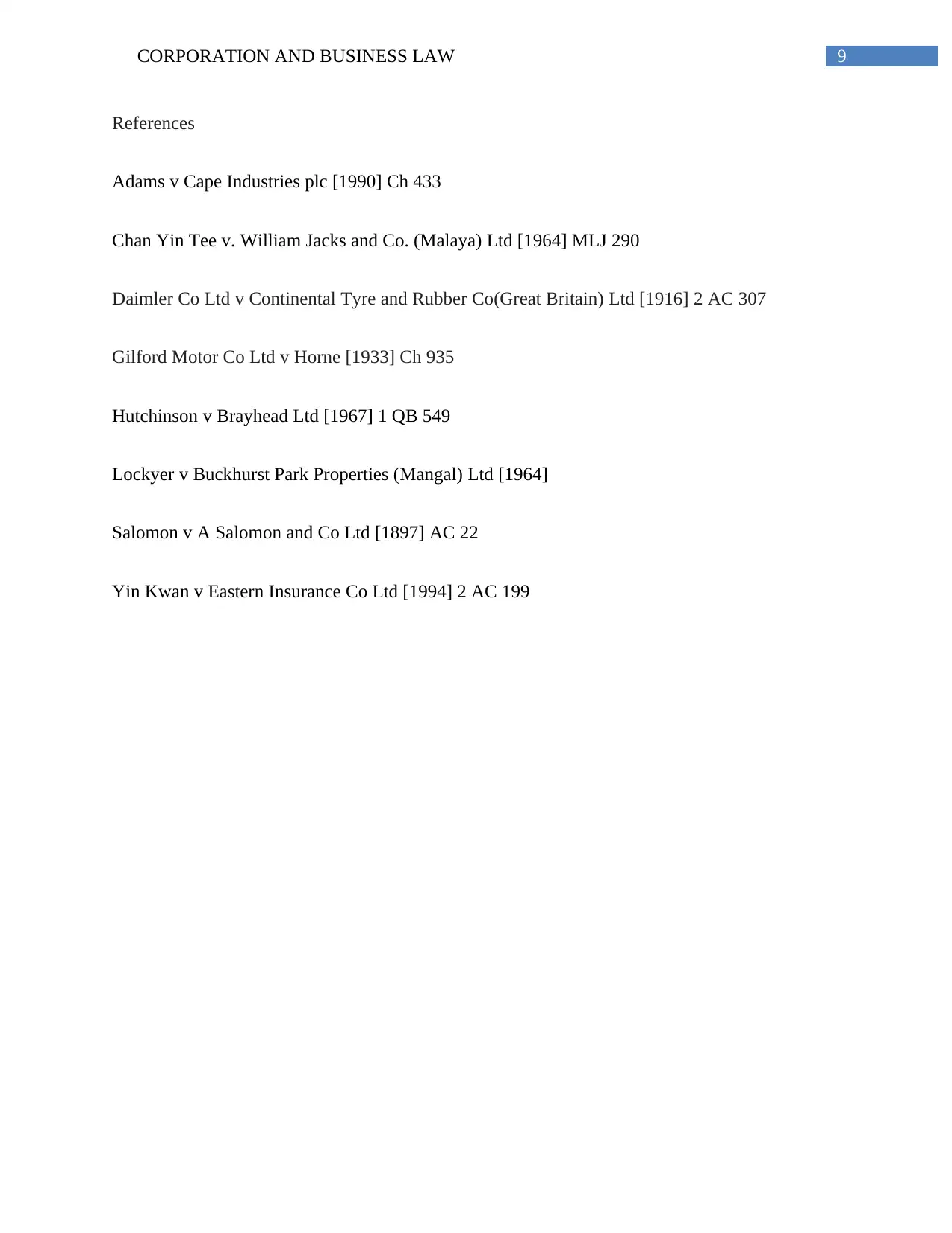
9CORPORATION AND BUSINESS LAW
References
Adams v Cape Industries plc [1990] Ch 433
Chan Yin Tee v. William Jacks and Co. (Malaya) Ltd [1964] MLJ 290
Daimler Co Ltd v Continental Tyre and Rubber Co(Great Britain) Ltd [1916] 2 AC 307
Gilford Motor Co Ltd v Horne [1933] Ch 935
Hutchinson v Brayhead Ltd [1967] 1 QB 549
Lockyer v Buckhurst Park Properties (Mangal) Ltd [1964]
Salomon v A Salomon and Co Ltd [1897] AC 22
Yin Kwan v Eastern Insurance Co Ltd [1994] 2 AC 199
References
Adams v Cape Industries plc [1990] Ch 433
Chan Yin Tee v. William Jacks and Co. (Malaya) Ltd [1964] MLJ 290
Daimler Co Ltd v Continental Tyre and Rubber Co(Great Britain) Ltd [1916] 2 AC 307
Gilford Motor Co Ltd v Horne [1933] Ch 935
Hutchinson v Brayhead Ltd [1967] 1 QB 549
Lockyer v Buckhurst Park Properties (Mangal) Ltd [1964]
Salomon v A Salomon and Co Ltd [1897] AC 22
Yin Kwan v Eastern Insurance Co Ltd [1994] 2 AC 199
1 out of 10
Related Documents
Your All-in-One AI-Powered Toolkit for Academic Success.
+13062052269
info@desklib.com
Available 24*7 on WhatsApp / Email
![[object Object]](/_next/static/media/star-bottom.7253800d.svg)
Unlock your academic potential
Copyright © 2020–2026 A2Z Services. All Rights Reserved. Developed and managed by ZUCOL.


